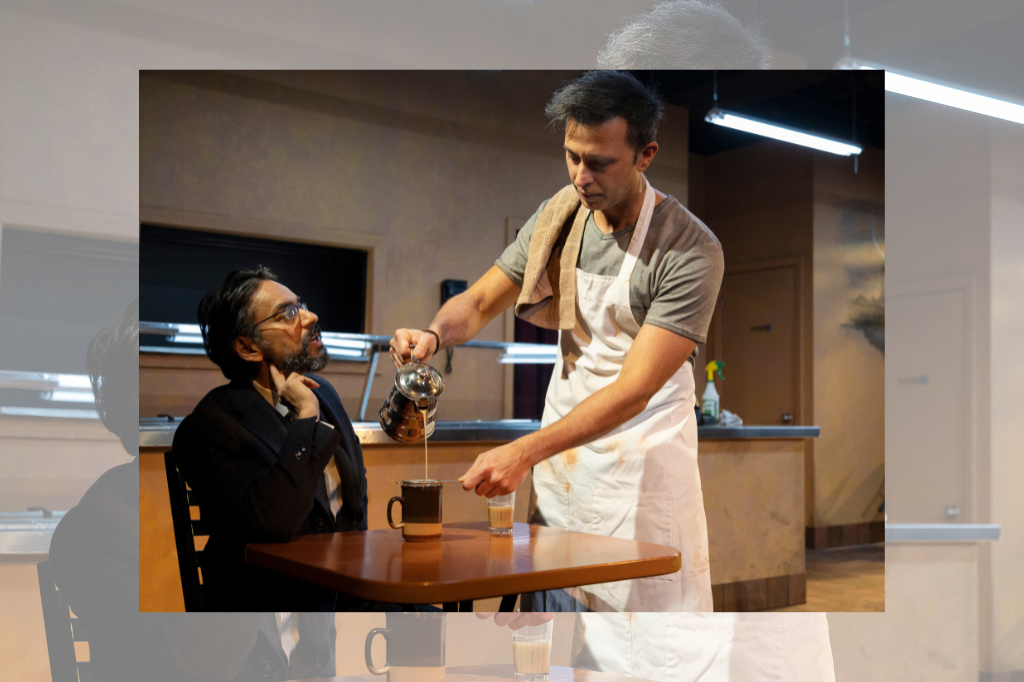REVIEW: Behind the Moon at Tarragon Theatre
In Behind the Moon, playwright Anosh Irani’s heartrending and captivating show now playing at Tarragon Theatre, undocumented Indian immigrant Ayub (Ali Kazmi) is constantly scrubbing the glass counter at the Mughlai Moon, the Toronto restaurant that is his world. Brandishing his spray bottle of cleaner like a weapon, the only defense he has, he polishes the surface obsessively.
It’s as if unclouding the glass surface that customers mar with their fingertips while pointing toward their food selections will help him find clarity in the choice he’s made to leave his wife and child in India and work for Qadir Bhai (Vic Sahay), a family friend who has brought him here as a “favour” to Ayub’s baba (father), with promises of establishing a permanent residency that never seems to become permanent.
As Ayub closes the restaurant for yet another lonely night, another Indian immigrant, a taxi driver named Jalal (Husein Madhavji), bursts in, claiming an emergency need for food from his home country. This mysterious stranger pushes Ayub’s small satellite in motion, rotating his perspective to give him the clarity he seeks. It’s not a happy realization: Irani’s lyrical script pulls no punches in showing us the dark side of the Mughlai Moon.
Walking into Tarragon’s Extraspace, audiences are greeted by a pitch-perfect representation of a small, counter-service Indian restaurant in Toronto, designed by Michelle Tracey. From the sign outside, to the blue mural on the wall, to the tiles on the floor in which Qadir continually demands to be able to see his reflection, it’s a place where city-dwellers will instantly feel at home. My guest commented that she could instantly visualize the basement and stairs beyond the back door, even though they remain unseen. It’s hard not to draw parallels between this show and Cahoots Theatre/Theatre Passe Muraille’s Our Place, both vibrant yet bleak commentaries on the situation of undocumented immigrants working in Toronto restaurants (in the case of the latter, a Caribbean restaurant, also fully realized on stage at Theatre Passe Muraille). The two shows form a diptych about the human beings — and human cost — behind the diverse food landscape we take for granted.
Particularly effective is the way the set opens to the ominous, dark outside, which holds mystery, danger, and a shaking tree branch. Tracey angles the entrance expertly, so that it feels like you could walk directly from the stage onto the street, assisted by Thomas Ryder Paine’s urban soundscape every time the door opens. The only issue with the extremely realistic set is that it makes it harder to sell the play’s occasional heightened portions of unreality, which could be clearer with some lighting cues (designer Jason Hand) to match the eerie outdoor effects.
Irani’s script, directed by Richard Rose, brings us humour and tragedy, satire and humanity, as tightly woven together as the carpet Jalal brings Ayub as a gift. Opening night audiences particularly enjoyed all of Ayub’s derisive comments about the depressing nature of Canadian winters. Meanwhile, Jalal’s attempts to connect with Ayub are filled with sympathetic compassion, getting more and more desperate as the latter shrinks further and further inward.
Almost never all on stage simultaneously, the three men still form a powerful acting triad. The change in Kazmi’s Ayub between his scenes with Jalal and with Qadir Bhai is significant; he goes from a commanding, irritated man who rules his domain to a servile and cringing mouse, coming slowly unhinged and twitching like a prisoner confined to solitary.
Sahay’s Qadir Bhai, smiling with the insincerely friendly audacity of a used car salesman, is obsessed with the trappings of success and power; he loves the sound of his name in the mouths of the wealthy. His attempts at kindness drip with condescension, involving gifts of hand-me-down designer products (“Look! Armani!” he exclaims), which are not what Ayub truly wants: a chance to go home and be with his family. While Qadir’s promises get emptier and emptier, Irani gives him a complex backstory as a man who came to Canada with nothing and suffered through societal ostracism, only to eventually own more “Moons” than even the Earth.
In a nice, subtle scene, he chastises Ayub for eating chocolate, then proceeds to snap off the remaining pieces of Ayub’s small luxury, consuming his chocolate bar throughout the scene until it is gone. Uncommented on, it’s a powerful visual metaphor for the death by a thousand cuts Ayub is suffering.
What the script does comment on is how a member of a marginalized community can either lift other members of their community up with their successes (or despite their failures), grind them down once they get the first taste of their own power, or do the latter while thinking they’re doing the former, reflected in a bitter monologue Ayub has about “Indians who think they’re better than other Indians.”
Jalal’s puzzling, magnetic appearances lend the play its sense of mystery. Madhavji, best known for the TV drama Saving Hope, gives an excellent performance. He plays Jalal with the mildly unhinged, otherworldly intensity of an Indian Jason Mantzoukas. His gregariousness eventually gives way to a wrenching inner pain that motivates him to return to the restaurant again and again.
There are some small aspects of Behind the Moon that still feel slightly rough. Because the subject matter and some of the stories are so intense, there are times where the actors don’t have to push as hard to sell the tragedy as they do, and can trust in the content alone. There are also times when the script grabs a powerful moment and takes it to what feels like an unnecessary extreme, such as a shocking action in the second act that is somehow less powerful than the words that come before it.
As well, women loom at the periphery of the script, wives and children, and for the most part Irani does a great job of making these unseen women fully realized people…which is why it’s disappointing that he also quite literally places them on pedestals in a later monologue. Trying to elevate the characters beyond reproach actually flattens them.
However, Irani’s adept use of language and metaphor more than make up for these minor disappointments.
Tarragon’s season, consciously or unconsciously, seems to be linked by the metaphorical comparison of oppressed people to misunderstood animals, both in the societal derision and mistreatment afforded them, and in their tenacity and ability to survive in the face of it all. In Cockroach, a young Chinese immigrant to Canada is compared to the titular insect; Redbone Coonhound portrays a Black man’s anguish at the racist epithets in the name of a dog breed which was likely subjugated as a tool to hunt down his ancestors.
In Behind the Moon, the metaphor is that of the rat, a creature that scurries around basements and streets, surviving on scraps, and that is capable of shutting down a restaurant if discovered within. Ayub’s horror at discovering one of these rodents, a slap in the face against his constant hard work and sacrifice, comes from the knowledge that the Indian restaurant down the street was recently closed due to an infestation. All he has done might be for nothing, due to events beyond his control. However, he soon comes to sympathize and even identify with the lowly rat, singing its praises and defending its right to exist and even prosper in the face of terrible odds and a miserable existence.
Like Ayub, Irani’s play movingly finds the beauty and the misery entwined in the search for a better life across the globe, giving us a world that is simultaneously too vast to traverse and too small to contain one man’s dreams.
And it lets us see those dreams as clearly as the food behind a freshly-polished glass case.
Behind the Moon runs at Tarragon Theatre February 21 through March 19, 2023.














Comments